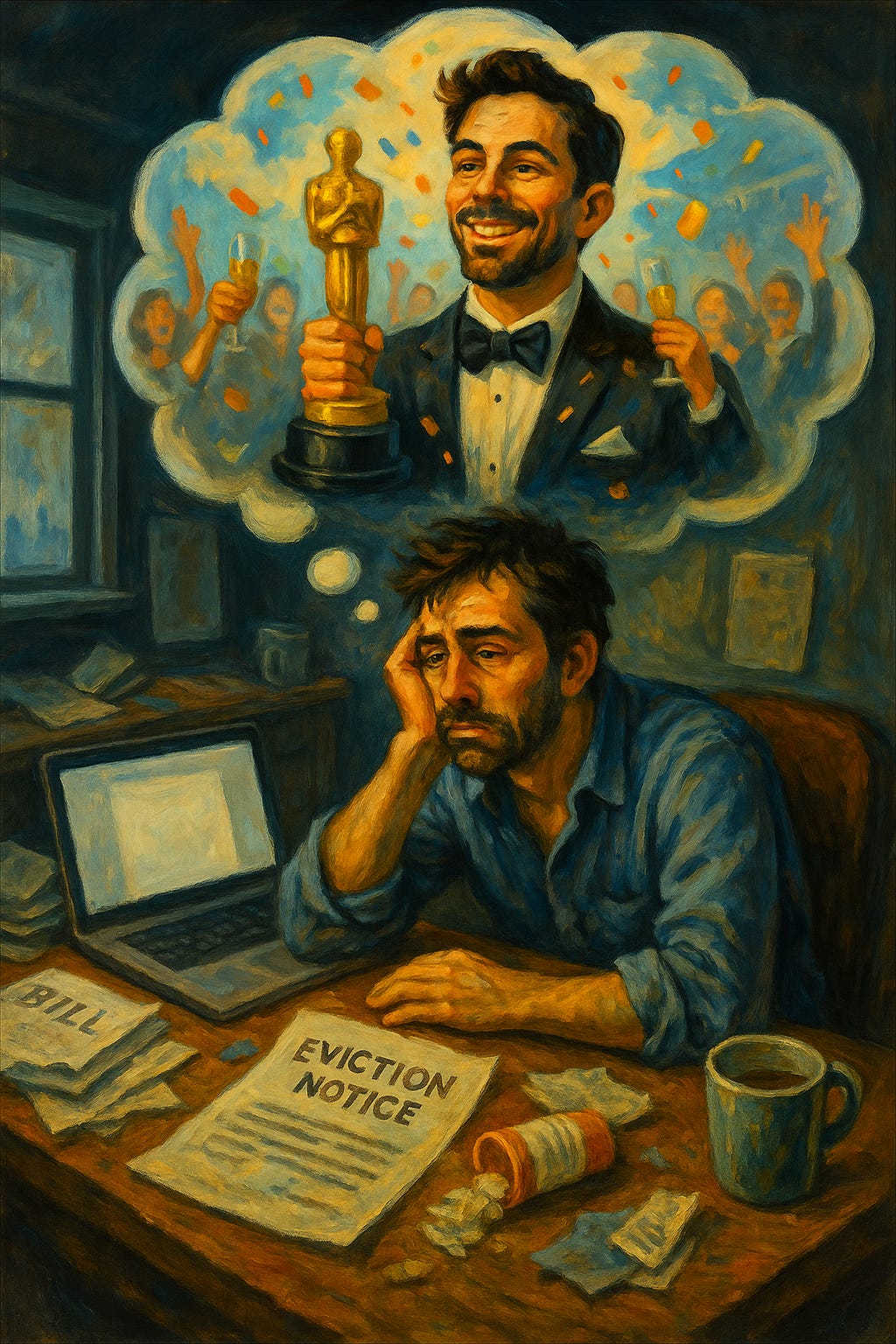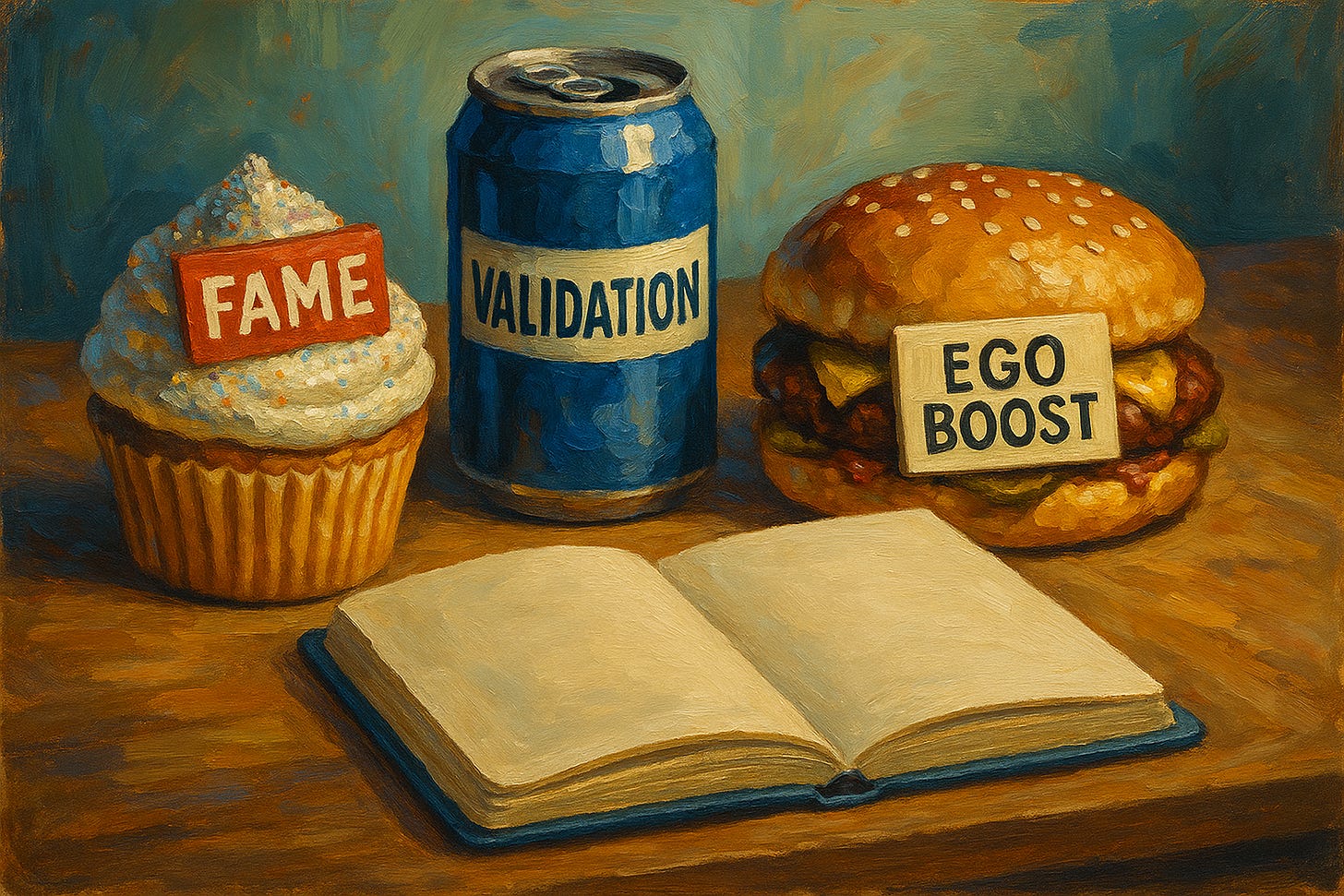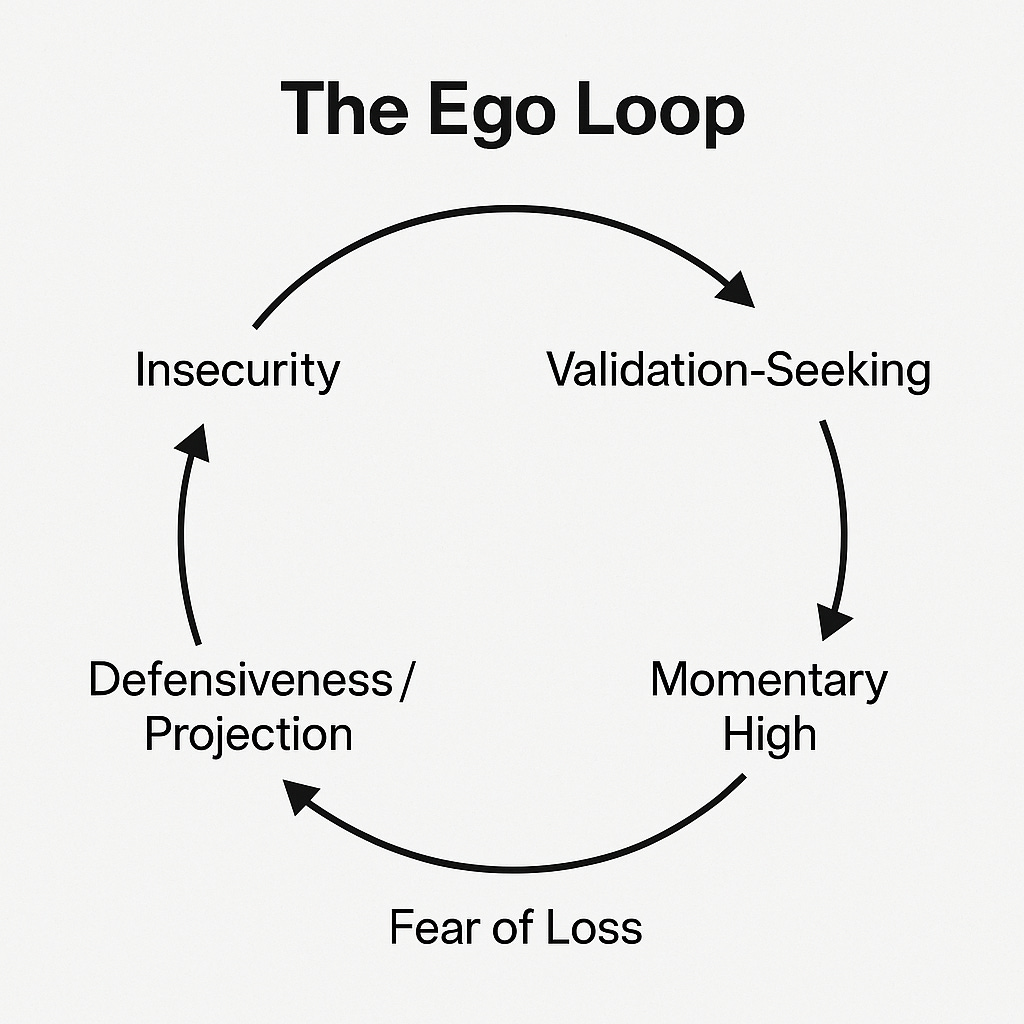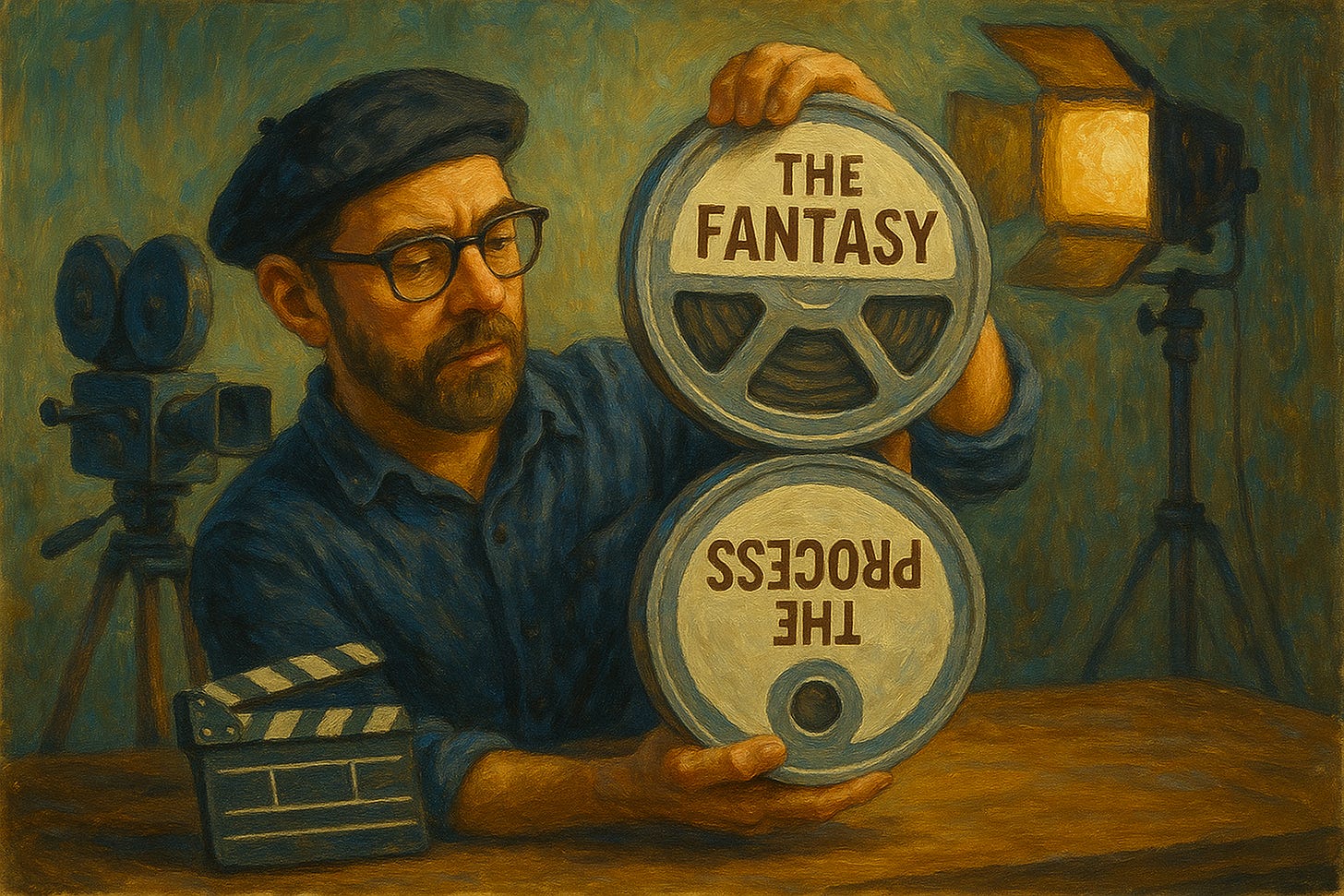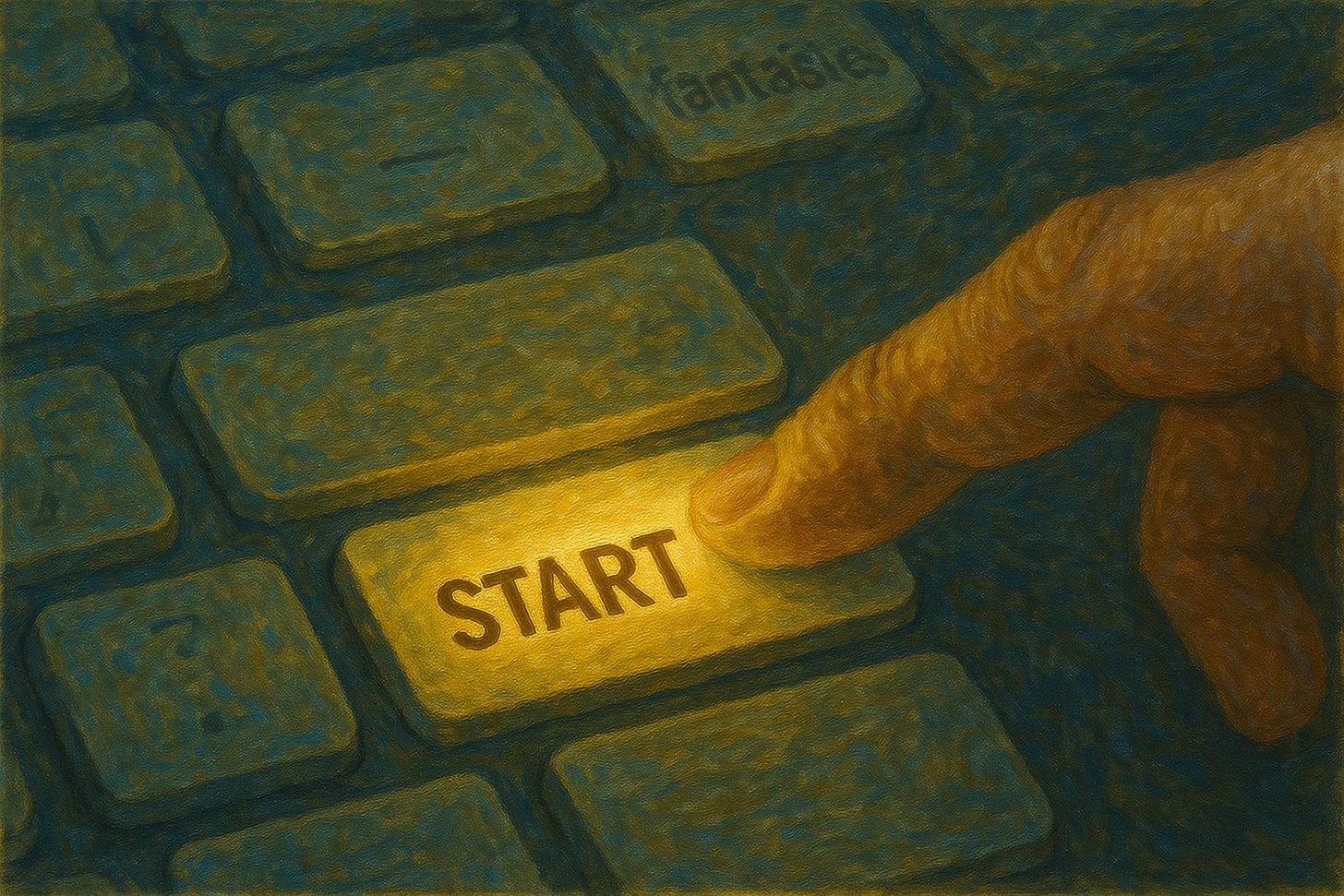Jack “The Bomb” WoodBern thought he was chasing greatness.
In truth, he was chasing dopamine. Story is here.
Most of us do the same. We mistake imagining the work for doing it — because the brain rewards the fantasy as if it actually happened.
“Daydreaming about just the reward is like junk food - quick energy, no nourishment, and a crash that leaves you emptier than before”
The Ego Loop
Fantasy → Dopamine → Satiation → No Action → Shame → More Fantasy
Every time you picture success — the applause, the book deal, the perfect body — your brain releases dopamine, the same chemical that fires when you accomplish something. You feel satisfied, but you’ve done nothing.
That brief reward trains your brain to crave fantasy instead of effort.
The ego loves this. In imagination, you can’t fail. You’re already great. You’re already safe.
But satisfaction without effort is like junk food — quick energy, no nourishment, and a crash that leaves you emptier than before.
What Successful People Daydream About
So if fantasizing about success is like snacking on dopamine, what do the builders and doers of the world consume instead?
Surely they daydream too — we all do. The difference is in the flavor.
The dreamers chase recognition; the doers picture reps.
The dreamers crave applause; the doers imagine progress.
Successful people still use imagination, but not to escape — they use it to rehearse.
They daydream about the process: the next meeting, the practice routine, the messy draft, the late-night grind. Their fantasies don’t feed ego; they feed readiness.
Psychologists call this implementation intention — imagination used as rehearsal, not relief.
The dopamine doesn’t come from the spotlight; it comes from the anticipation of motion.
Marcus Aurelius did it too. He didn’t daydream about glory; he imagined waking before dawn, facing rudeness, fatigue, and fear — so he’d meet them calmly when they came.
The Stoics didn’t suppress imagination; they disciplined it.
How to Retrain Your Imagination
Turning fantasy into fuel instead of escape.
1. Catch the Cue
When your mind drifts to applause or perfection, notice the shift.
Label it: “I’m in the movie again.”
Pause. Breathe. Look around. Feel what’s real.
Awareness moves control from the reward system to the rational mind.
2. Flip the Script
Ask: “If this fantasy were real, what would the work to get there look like?”
Imagine the grind, not the glory.
Visualize the rehearsal, not the award.
This rewires dopamine toward anticipation of effort, not admiration.
3. Use If–Then Rehearsals
Turn imagination into readiness training.
If I get distracted, then I’ll set a 5-minute timer.
If I feel unmotivated, then I’ll reread yesterday’s notes.
Expect friction. Move anyway.
4. Anchor with Immediate Action
After every redirected fantasy, take one small physical step:
write a sentence, send an email, do one push-up.
Action replaces counterfeit reward with the real thing.
5. Keep Track of the Reps
Find a way to keep track of the following or at least keep a mental note:
When did my ego start the movie?
How did I redirect it?
Reflection builds awareness faster than discipline alone.
6. Stoic Visualization
Morning or evening, imagine the day honestly — interruptions, fatigue, rejection — and see yourself responding with calm purpose.
That’s Premeditatio Malorum: training for reality, not fantasy.
When the Fantasy Changes the Subject
(Is it distraction or direction?)
Not every daydream is sabotage. Sometimes, it’s a signal.
If you’re supposed to be writing, but your mind keeps wandering to flying planes or running a café, that might not be your ego avoiding work. It might be your deeper self whispering: “This isn’t where your energy lives anymore.”
Ask yourself:
Does it vanish after effort? → Distraction.
Does it persist after effort? → Maybe direction.
What emotion drives it? Pride or curiosity?
The Stoics wouldn’t tell you to kill the fantasy — only to interrogate it.
If it’s fear, apply discipline.
If it’s longing, apply honesty.
Sometimes the craving isn’t to abandon your path — it’s to rediscover the energy that once lit it.
Sometimes the fantasy isn’t pulling you away from purpose; it’s pulling you back to it.
The Practice of Reality
Marcus Aurelius said, “Waste no more time arguing what a good man should be. Be one.”
Jack’s fantasies weren’t evil — they were fear in disguise.
The cure isn’t less imagination; it’s truer imagination — grounded in effort, friction, and virtue.
When your ego starts spinning new headlines — The Genius Returns, The Comeback of the Century — smile, close the tab, and start your work.
Because the only story that matters is the one you actually finish.
One-Minute Habit Reset
Visualize the first 60 seconds of real work.
Start a 5-minute timer.
Do the thing — badly if needed.
Stop when it dings.
Congratulate yourself for reality, not fantasy.
The Pulitzer can wait.
Write the first damn sentence.


